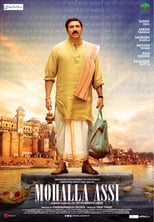Rakesh sharma
Nov 15, 2018
Director Chandraprakash Dwivedi beautifully recreates the Mohalla Assi in this religious/political satire based the novel Kashi Ka Assi. The neighborhood of Assi itself is the protagonist of this movie. The identity of Assi is not just defined by the fact that it is ghat along the holy river, rather it is the also the people who live in that locality. People participate in daily "parliamentary discussions" on the changing society and importance of culture at the only place in Varanasi that has democracy, Pappu's tea shop. The characters in the tea shop look straight out of a satire novel in Hindi. The conversations at this shop tie the whole script together and take the story forward. What makes it worth watching is the context that is set around it. It also tries to depict the impact that major religion- based political events had on the people of the society. The humor is very intelligent and contextual, since it is a satire.
The story of the movie was a simple one, where a diligent and honest priest struggles to make ends meet, whereas other half baked gurus dupe the tourists to mint money and lead a comfortable life. It shows how westerners come to the city in search of spirituality and have no clue about what they want. How the city in its own corrupt ways connives to thug them, thereby destroying the moral fabric of it's culture one bit at a time. Ravi Kishan and other supporting characters deliver a wonderful performance as the whole locality revolves around these tourists.
Sunny Deol as the righteous priest beautifully projects the perplexities that the character goes through as he comes to term with the practical challenges of life. However, it is Sakshi Tanwar, as his wife, who really delivers a stand out performance, questioning his eccentricities and still standing by him as a pillar of support. Together they go through their struggles, to find a way to live with their values in this world.
The film got banned because of the cuss words used in the movie, but as a character says that in the culture of Varanasi, everyone is greeted with "bhosadi k" just like they are greeted with "Har Har Mahadev".
